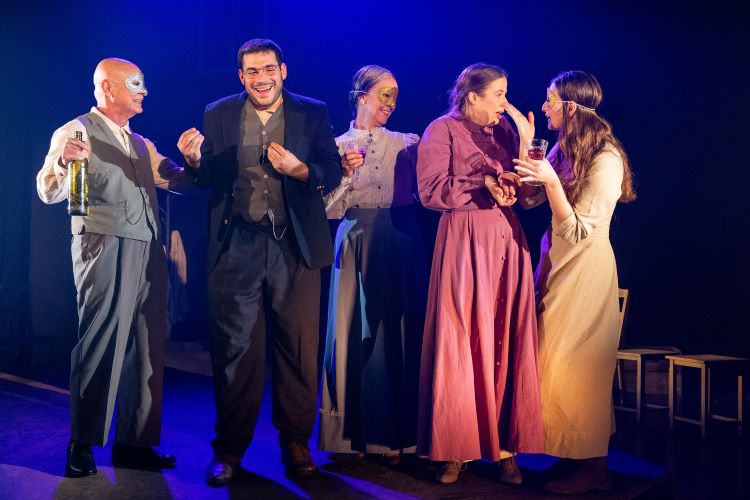
The Khan Theatre production of A Simple Tale, directed by Yotam Gotal, brings a contemporary sensibility in a lyrical and humorous adaptation of the novel by S. Y. Agnon. Music and movement are an integral part of the performance, expressing meaning that goes beyond words, and bringing a certain lightness, as well as depth to the performance. The dramaturgy and music are by Dori Parnes, and movement design by Polina Dreyden, with live onstage piano performed by Yair Seri. Agnon’s novel is distilled into its essence in this production, which features just five main characters, with actors taking on dual roles to portray minor characters. The set and costumes reflect this motif. The story takes place in the town of Szybusz in Galicia at the beginning of the 20th century. The set, rather than attempting to recreate the Jewish community of that time, suggests the time and place in its wooden floors and chairs. The minimalist set design by Dina Konson enables a dynamic performance, while Liron Sapir’s costume designs immediately evoke the period. At the heart of the play is the conflict between social norms and values and the individual, between doing what is deemed practical and wise in the eyes of the community and following one’s heart.
The play begins with the death of a poor widow, which leaves young Blume (Anna Pugatch) an orphan. Agnon’s social critique and wry humor are evident from the start as the townspeople strongly urge the penniless orphan to leave the community and seek out her relatives in Szybusz. It’s worth noting too that the name of the town – Szybusz, sounds like a word in Hebrew which means “something that has gone wrong.” Blume arrives at the home of her relatives – Boruch Meir Hurvitz (Erez Shafrir), his wife Tsirl (Irit Pashtan) and their son Hirshl (Gal Zak), who run a family store. There is a hierarchy in the Jewish community, and Blume understands her place. She knows she must make herself useful and spends her first night in the Hurvitz home baking cakes for the family’s breakfast.
Intelligent, industrious, and lovely, it is no surprise that Hirshl is drawn to Blume. Yet even Hirshl is bound by the same prejudices as his community, asking Blume how is it that she, a young woman from a poor family, knows how to read. Irit Pashtan is formidable as the force that is Tsirl, determined to do what she believes will benefit the family – increase profits and elevate their social status. Erez Shafrir portrays Boruch as a gentler, yet weaker, character. He thinks Blume should be paid for her work, yet Tsirl easily manipulates him into agreeing with her view, that offering Blume room and board is more than enough. When Hirshl wants to marry Blume, Tsirl takes swift action, and instead he marries Mina (Nitsan Levartovsky), the only daughter of a wealthy family.
Yet Hirshl’s heart still yearns for Blume, and Gal Zak depicts his agony and ultimate spiral into madness with touching vulnerability. Mina may be seen here as a representative of community norms, entering the marriage with Hirshl with earnest sincerity, because that is how things are done: parents decide what is best for their daughter. As such, she is eager to make the marriage work and bewildered by Hirshl’s strange behavior.
Jewish tradition and symbolism are an integral part of the play, whether it is the joyous celebration of a wedding, or the custom of sacrificing a chicken as kapara, atonement for sins. The Khan production of A Simple Tale reflects Agnon’s critical yet affectionate gaze on the Jewish community, it’s social norms and hierarchy. Engaging and thought-provoking, the play raises issues that remain urgently relevant in our own time and lives – individual vs. community, how we regard mental illness, social and economic hierarchies, and how we think of, and respond to, differences.





